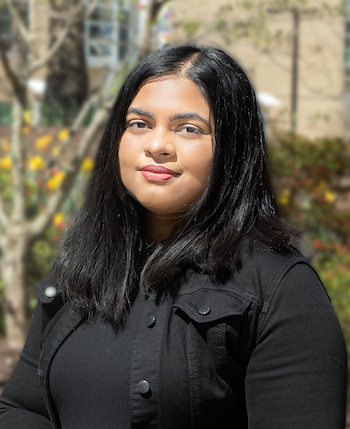In This Story

It was 7 p.m. in Dhaka, the capital of Bangladesh, and Ahna Mohiuddin was just beginning her school day at George Mason University.
It was the 2020 Fall semester, and Mohiuddin, a cyber security engineering major, was back in her hometown because Mason had pivoted to online learning during the early stages of the pandemic.
The problem was the 10-hour time difference, which meant that when her classes began at Mason, it was nighttime in Bangladesh, and that meant taking classes sometimes all night until 8 a.m., and sleeping during the day.
“It was definitely challenging,” said Mohiuddin, who is also a member of Mason’s Honors College. “I figured if I slept during the day and woke up at night it would be okay. But, I guess, it’s just that if everything is dark outside, I sometimes felt drowsy, and it was definitely hard to concentrate.”
“It shows her perseverance and her drive,” said Peggy Brouse, associate chair for undergraduate studies in the Cyber Security Engineering Department. “She wants to be very successful in her field, and she probably will be.”
Mohiuddin was born in Knoxville, Tennessee, though she was mostly raised in Bangladesh, moving there with her family. She and her parents returned to the United States in 2016 to investigate colleges, including Mason.
Mohiuddin said she liked Mason’s cybersecurity program and the challenge of the Honors College, and her family liked the Fairfax, Virginia, area. Now a senior, Mohiuddin is one of the top students in the cyber security engineering program.
She also has become a project leader, a persona Brouse said Mohiuddin did not immediately put forward. But over time Mohiuddin found her voice, in class and in group projects.
“I just love when that happens,” Brouse said. “She has a way of making other students feel comfortable and taking on a natural leadership role. She incorporates everybody and gets them involved and gets the most out of everybody on the team.”
That is important, Brouse said, because cybersecurity employers want team players.
“They figure they’re all going to know the technical stuff,” Brouse said. “But they want people who can work with other people and be ethical. She encompasses all of that.”
She is also self-sufficient.
Consider the end of her Spring 2020 semester, when Mohiuddin not only had to pack up her dorm room before flying home to Bangladesh because of the pandemic, but had to take a final exam the day before she left. She then flew 24 hours to Dhaka just in time to take another final that began at 3 p.m. at Mason, which was 1 a.m. in Bangladesh.
“I guess I relied on a lot of coffee to stay awake,” Mohiuddin said of managing the time difference.
It’s all easier now, living with her parents in Fairfax, despite her busy schedule that is also giving her real-world, hands-on experience.
Mohiuddin is a data analyst undergraduate research assistant in a project using data analytics to help disrupt illicit supply chains of personal protective equipment and opioids such as fentanyl. The five-year, $650,000 project, funded by the National Science Foundation, is spearheaded by Louise Shelley, director of Mason’s Terrorism, Transnational Crime and Corruption Center, and Edward Huang, an expert on supply chain network design in the Volgenau School of Engineering.
Mohiuddin is also a peer mentor in the College of Engineering and Computing and an office assistant in the Honors College.
She previously was an undergraduate teaching assistant in computer science and a learning assistant in mathematics.
“I’ve had a really great experience at Mason,” Mohiuddin said. “I’ve made a lot of friends, and the work I’ve done has always been a positive thing.”
“She’s very humble,” Brouse said. “But she doesn’t need to be.”
